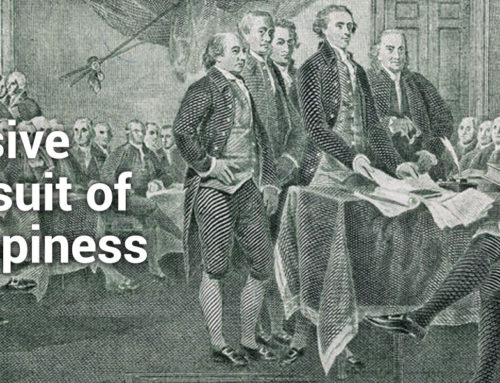In my previous blog, I listed the ten steps to follow for success in any endeavor (learn more). Leadership is all about transforming ideas into significant results. The bigger and better the ideas, the bigger and better the results. As you will see, there is plenty of time to inject reality into your dreams but why start with limiting beliefs about what you are capable of?
Throughout my career, found that the vast majority of staff that worked for me were underutilizing their talents. This was particularly prevalent in Europe where there are still remnants of an old-school culture that grew out of the guild system of the Middle Ages. If your father was a craftsman, that pretty much was the level to which you could aspire.
It was very different growing up in the US. We were influenced by Horatio Alger rags to riches stories where anyone in America, regardless of their background or station in life could grow up to be a millionaire. All it took was hard work, determination, courage and honesty. While the stories were mostly myth (a miniscule number of us actually became rich), the important thing was that we believed that we could, and it created a culture of dreamers and youngsters with big ambitions. When we came face to face with reality, we had to temper our ambition, but I’m convinced that those big dreams helped us to set and achieve higher goals than we would have otherwise. While my dad had only a third-grade education and labored as a fisherman, I received my Ph.D. in Chemistry and became a senior Vice President of two well-known technology organizations. I have my doubts that this could have happened if my grandfather had not immigrated from Europe to find a better life in America.
So, before you head down a path that will limit your potential, doesn’t it make sense to at least estimate what your potential is? Even if you are well on your way somewhere, wouldn’t it also make sense to reevaluation your destination to see if you could go further? The path to self-discovery is long and arduous but well worth the effort. To quote Socrates, “The unexamined life is not worth living”.
Your ultimate potential has a lot to do with an honest appraisal of your attributes. By attributes I mean the unique qualities and characteristics that define you as a person. From my point of view, the fundamental attributes that determine your potential are motivation, natural talent, self-awareness and acquired skills.
Examine your motives
The first key attribute and in many ways the most important is motivation. As a young professional, I viewed every promotion opportunity as a way of getting ahead, making more money, and having more prestige. These extrinsic drivers were important to me having grown up in a family with very limited resources. While a healthy dose of ambition can be an initial driver, in my experience is not sufficient to sustain the kind of motivation and extraordinary effort that is needed to ensure successful completion of difficult assignments. After the initial ego gratification and bump in salary wears off, you are left with the day-to-day pressures and difficulties of performing. Peter Drucker’s advice is “given the choice between making more money or gaining more experience, always chose gaining more experience”.
Later in my career, I became less interested in my personal accomplishments and much more interested in growing high performance technical organizations that also satisfied the career aspirations of my fellow scientists and engineers. Building teams proved to be much more stimulating and rewarding for me and as it turns out increases the probability of success. My ambition now is to coach up-and- coming technical managers by passing on the hard lessons I’ve learned over the years in order to accelerate their leadership development. This is so rewarding that it doesn’t even feel like work anymore.
The cliché “pursue what you love, and you will never have to work a day in your life” has an element of truth in it. Achieving your full potential is really hard work. If you want something bad enough you will find a way, if not, you will find an excuse. Start by asking the question “Why am I interested in pursuing this particular dream and will achieving it have meaning and purpose for me”? The answer will help determine whether you have the passion and energy necessary to work at full capacity and persevere through the tough obstacles that you will inevitability encounter.
Discover your true talents
There is a strong correlation between what you love to do and your specific talents (i.e. natural born skills). At an early age, all of us derived pleasure and satisfaction from the success and positive feedback we got from displaying our natural born skills. As a result, we tended to spend more time and attention in nurturing those skills and applying them to our daily life. Some realize at an early age that they are more likely to be happier and probably more successful if they choose careers that require the use of their specific talents. Their choice may or may not have anything to do which how much money they can make. Others like myself, focused at first on the economic return that specific careers could offer and had to readjust when the money just wasn’t enough to motivate us to achieve at our full potential.
I discovered early on that two of my more obvious talents were my curiosity and skill in mathematics. These talents along with my desire for getting ahead and making money drove me toward a career in science and engineering (chemical engineers at that time topped the annual professional earnings list). While I was pretty successful early in my career as a bench scientist, I found that it wasn’t as fulfilling as I would have liked. While it satisfied my love for exploration and discovery, the progress of science is very slow, and the day-to-day activity required very little interaction with others. Given my gregarious nature and lack of patience, I knew that I had made a career mistake. With additional introspection, and experience, I discovered that with my scientific base, I could take advantage of my other talents. My competitiveness and salesmanship talents allowed me to move out of the laboratory and into business development, which I loved. Writing a complex proposal for funding with my colleagues and winning competitive contracts was almost as much fun as the sandlot touch football games I enjoyed so much as a teenager.
I now have a greater appreciation and great deal of respect for individuals who persist in following their dreams regardless of the level of remuneration. In my book, they will achieve far greater rewards than a bigger car or larger house.
Discovering your true talent is not an exercise to be taken lightly. It took me years of analysis and practice to increase my self-awareness before I found out what my real ikigai was. Ikigai is an Okinawan expression for why I get out of bed every morning. Talent comes in a variety of different physical and mental forms if you look hard enough. It can be a photographic memory, attention to detail, an eloquent voice, imposing stature, an analytical mind, persistence: spend time in self-discovery to find your unique set of talents and determine how they can be best used to achieve your dreams.
Overcome your fears
The two biggest killer of dreams are the fear of competence and the fear of failure. These are manifested in your mindset and thoughts. Common thoughts include “What if I’m not good enough” and What if I fail”? It is important to remind yourself often that “you are what you think about every day”. Self-discipline begins with the mastery of your thoughts. If you don’t control what you think, you can’t control what you do.
I made progress in overcoming these fears a couple of different ways. I wish I would have figured it out a lot earlier in life. I finally eliminated the word failure in my vocabulary. I now use the word outcome. Whenever I try something new, it results in an outcome. Sometimes the outcome is what I expected and results in what I wanted. Other times the outcome was not what I expected, and I wound up learning something. I’ve come to realize that there are only two possible outcomes from anything I try and I either achieve or learn; both of which are useful. With this mindset, I’m never afraid to try something new.
The second fear, not being good enough, is much more insidious. Developing a healthy self-confidence takes time and concentrated effort. By healthy self-confidence, I mean knowing what you know, and knowing what you don’t know, and not being afraid to make prudent decisions based on your current level of awareness. The higher your self-awareness the better decisions you will make. The better decisions you make, the more self-confident you will become. You must take personal responsibility for your own development starting with increasing your self-awareness. Expect the development process to last a lifetime and enjoy the exploration. Some recommendations I can make based on personal experience are the following:Become more introspective – find out what really motivates you, what drives your behavior, why do you do the things you do. In time you will discover your hidden strengths and become aware of your not so obvious weaknesses.
- Find a good mentor – an hour spent with a wise man is worth a thousand hours reading books. One of the hardest things to do is to see ourselves as others see us. A good mentor should make you feel uncomfortable at times.
- Observe and model leadership behavior – watch what outstanding leaders do in a variety of situations and read autobiographies.
- Be willing to dent your ego – listen to feedback from others even if you don’t want to hear it. When you experience unfavorable reaction from people, instead of rationalizing, ask yourself “what was it that I said, or did that trigger that reaction”.
- Seek continuous improvement in your self-awareness – Constantly evaluate your decisions and actions by conducting a “lessons learned” exercise. Decide what went right and what went wrong and objectively examine the reasons why. Then commit to improving that decision or action the next time. This is the process of continuous improvement and lifelong learning.
On my wall in my office is a plaque with my favorite reminder, “better than yesterday, not as good as tomorrow”. Once you start on this lifelong journey of self-discovery, I assure you, you will find it personally rewarding. You will also find that each success will lead to bigger and better dreams as you get more confident about who you are and what you are capable of.
For a more in-depth discussion of this topic, read Leading Science and Technology Organizations: Mastering the Fundamentals of Personal, Managerial, and Executive Leadership.
Stay tuned for my new free E-book coming out next month, On Becoming a Three-Dimensional Leader.


